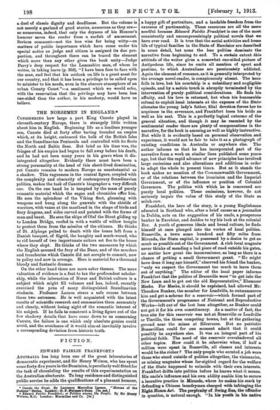THE NORSEMEN IN ENGLAND.*
CONSIDERING how large a part King Canute played in eleventh-century Europe, there is strangely little written about him in English. Beginning life as a landless younger son, Canute died at forty after having founded an empire which, at its height, embraced the bulk of the British Isles and the Scandinavian Peninsula and controlled with its fleets the North and Baltic Seas. But brief as his time was, the fringes of his empire had begun to fall away before his death, and he bad not been many years in his grave when it dis- integrated altogether. Evidently there must have been a strong personality at the head of this short-lived domination, yet Canute remains to modern Europe as unsubstantial as a shadow. This vagueness in the central figure, coupled with the complexity and obscurity of contemporary Scandinavian politics, makes the task of Canute's biographer a very difficult one. On the one hand he is tempted by the mass of purely romantic material which the sagas and chronicles offer him. He sees the splendour of the Viking fleet, gleaming with weapons and hung along the gunwale with the shields of warriors, with vanes at the masthead in the shape of birds and fiery dragons, and sides carved and painted with the forms of man and beast. He sees the ships of Olaf the Stout gliding up to London Bridge, roofed in with a wattle of willow boughs to protect them from the missiles of the citizens. He thinks of St. Alphege pelted to death with the bones left from a Danish banquet, of Sigrid, the haughty and much-wooed, who to rid herself of two importunate suitors set fire to the house where they slept. He thinks of the two massacres by which the English aroused the fury of the Dane, and of the murders and treacheries which Canute did not scruple to commit, now in policy and now in revenge. Here is material for a thousand bloody and fantastic dramas.
On the other band there are more sober themes. The mere valuation of evidence is a feat to tax the profoundest scholar- ship, while the interaction of Norse and British culture is a subject which might fill volumes and has, indeed, recently exercised the pens of many distinguished Scandinavian students.. Professor Larson steers a safe course between these two extremes. He is well acquainted with the latest results of scientific research and summarizes them accurately and clearly, without losing sight of the romantic interest of his subject. If he fails to construct a living figure out of the few shadowy details that have come down to us concerning Canute, the failure is one which only absolute genius could avoid, and the avoidance-of it would almost inevitably involve a corresponding deviation .from historic truth.










































 Previous page
Previous page